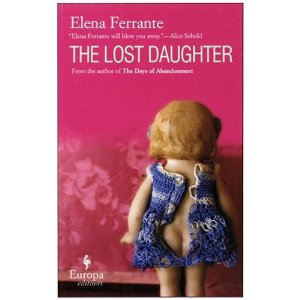Books |
The Lost Daughter
Elena Ferrante
By
Published: Oct 19, 2021
Category:
Fiction
A movie to look forward to, twice in a week? I haven’t seen “The Lost Daughter,” but I’ve read Elena Ferrante’s novel and watched the trailer — it’s here — and Maggie Gyllenhaal adapted the book and is making her directorial debut, and it stars Olivia Colman, and Ed Harris and Peter Sarsgaard are in the cast, so it’s safe to assume a powerful film awaits us on December 17th in theaters and December 31st on Netflix. As ever, your movie experience is enhanced if you’ve read the novel, so….
A woman walks out on her husband and their six- and four-year-old daughters.
She doesn’t quite put it that way.
“When my daughters moved to Toronto, where their father had lived and worked for years, I was embarrassed and amazed to discover that I wasn’t upset; rather, I felt light, as if only then had I definitively brought them into the world. For the first time in almost twenty-five years I was not aware of the anxiety of having to take care of them. The house was neat, as if no one lived there, I no longer had the constant bother of shopping and doing the laundry, the woman who for years had helped with the household chores found a better paying job, and I felt no need to replace her.”
As told by the mother, it sounds like a simple story. Leda is 47, divorced, an academic, mother of daughters who are now in their 20s and live in Canada with their father. She rents an apartment for a month in an Italian beach resort. She has no lover, she’s completely alone. And so she falls into the habit of going to the same stretch of beach every day.
You know how it is when you’re a stranger in a strange town? You make up stories about the people you see. Leda does this with a woman and her child who also spend their days at the beach. They’re lined up like planets — Leda, the “bad” mother, then the mother who “seemed to have no desire for anything but her child,” and then the little girl, so secure in her mother’s love that she gives all her attention to an old doll.
One day, the little girl gets lost. Leda — who, as we know, long ago abandoned her own kids — finds her. And now the plot starts to circle itself, and tighten, forcing Leda to remember more of her own story.
This a natural situation for Elena Ferrante, the much-admired Italian novelist. [To buy the paperback from Amazon, click here. For the Kindle edition. click here.]
On page two, Leda says that “the hardest things to talk about are the ones we ourselves can’t understand.” For her, that’s abandoning her daughters, all those years ago. Her first explanation, to the mother on the beach: “Sometimes you have to escape in order not to die.”
Believe that at your peril. There’s much more. But what’s compelling is how little it takes to lose your bearings — a small burst of attention, modest encouragement, a bout of illicit sex. The next thing you know, you’re a stranger to yourself, you’re a foreigner in your own body. The scene when Leda leaves her kids — it’s not wrenching like “Kramer vs. Kramer,” it’s one matter-of-fact paragraph. In its way, that’s more wrenching.
Which is not to say that this is a story by a woman who can do nothing but watch and think. Something happens midway through. It’s simple, trivial, blatantly symbolic — it’s so obvious you grimace. Why is that? Because you haven’t abandoned a child. And you never would.
So it is the astonishing triumph of this simple, short (125 page) novel that, slowly, you come to identify with a woman who has done the unthinkable. And, in the aftermath, you feel a bit unhinged.
“I had left my husband and my daughters at a moment when I was sure I had the right, was in the right,” Leda says near the end of the novel. And as if you’ve been in the sun at the beach all day and have just returned to the shade and a breeze and a cool drink, you blink — because you’re just not sure if that would be your final answer. And, if it would be, what that says about you.
What a beautiful, disturbing, thought-provoking book.


